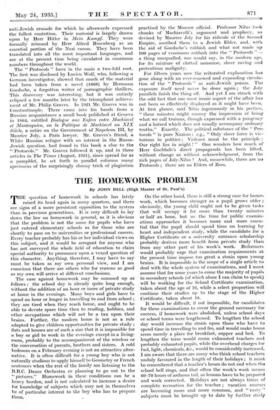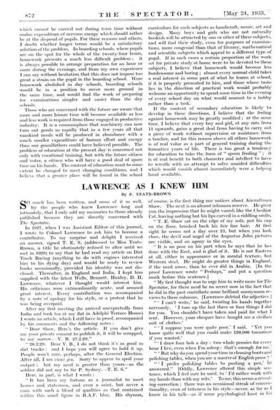THE HOMEWORK PROBLEM
By JOHN BELL (High Master of St. Paul's)
THE question of homework in schools has lately raised its head again in many quarters, and there are signs of a more persistent opposition to the system than in previous generations. It is very difficult to lay down the law on homework in general, as it is obvious that the problem is not the same for pupils who have just entered elementary schools as for those who are shortly to pass on to universities or professional careers. Every teacher probably has his or her individual views on this subject, and it would be arrogant for anyone who has not surveyed the whole field of education to claim special authority to pronounce upon a vexed question of this character. Anything, therefore, I may have to say must be taken as my own personal view, and I am conscious that there are others who for reasons as good as my own will arrive at different conclusions.
The case against homework may be summed up as follows : the school day is already quite long enough, without the addition of an hour or more of private study at home in the evenings. Many boys and girls have to spend an hour or longer in travelling to and from school ; they are tired when they reach home, and ought to be able to devote spare time then to reading, hobbies, and other occupations which will not be a tax upon their brains. Further, the modern home is not as a rule adapted to give children opportunities for private study ; fiats and houses are of such a size that it is impossible for a boy or girl to work in the evenings except in a living- room, probably to the accompaniment of the wireless or the conversation of parents, brothers and sisters. A cold bedroom on a February evening is not an attractive alter- native. It is often difficult for a young boy who is not 'naturally studious to apply himself to Geometry or French sentences when the rest of the family are listening to the E.R.C. Dance Orchestra or planning to go out to the " pictures." Homework in these conditions can be a heavy burden, and is not calculated to increase a desire for knowledge of subjects which may not in themselves be of particular interest to the boy who has to prepare them. On the other hand, there is still a strong case for home- work, which becomes stronger as a pupil grows older ; obviously, the young child ought not to be given tasks that will occupy it for more than twenty minutes or half an hour, but as the time for public examin- ations approaches it becomes more and more essen- tial that the pupil should spend time on learning by heart and independent study, while the candidate for a Higher Certificate or a university entrance scholarship probably derives more benefit from private study than from any other part of his week's work. Reformers would probably urge that examination requirements at the present time impose too great a strain upon young brains. It is impossible in the scope of a single article to deal with the whole system of examinations, and I must assume that for some years to come the majority of pupils in secondary schools (of which alone I can claim to speak) will be working for the School Certificate examination, taken about the age of 16, while a select proportion will continue their studies up to the stage of the Higher Certificate, taken about 18.
It would be difficult, if not impossible, for candidates for these examinations to cover the ground necessary for success, if homework were abolished, unless school days or school terms were lengthened. To lengthen the school day would increase the strain upon those who have to spend time in travelling to and fro, and would make home seem merely a place for breakfast, supper and bed. To lengthen the term would mean exhausted teachers and probably exhausted pupils, while the overhead charges for fuel, light, chemicals, &c., would be considerably increased. I am aware that there are many who think school teachers unduly favoured in the length of their holidays ; it must be remembered that a teacher's hours do not end when the school bell rings, and that often the week's work means 60-70 hours of arduous toil, as lessons have to be prepared and work corrected. Holidays are not always times of complete recreation for the teacher ; vacation courses are becoming more and more common, and " rusty " subjects must be brought up to date by further study which cannot- be carried out• during term time without undue expenditure of nervous energy which should rather be at the disposal of pupils. For these reasons and others, I doubt whether longer terms would be a satisfactory solution of the problem. In boarding schools, where pupils arc On the spot for the whole of the twenty-four hours, homework presents a much less difficult problem ; it is always possible to arrange preparation for an hour or more during the evenings, and from my own experience I can say without hesitation that this does not impose too great a strain on the pupil in the boarding school. Were homework abolished in day schools, boarding schools would be in a position to cover more ground in the same time, and would find the work of preparing for examinations simpler and easier than the day schools.
Those who are concerned with the future arc aware that more and more leisure time will become available as less and less work is required from those engaged in productive industry. It is a commonplace that machinery can now turn out goods so rapidly that in a few years all that mankind needs will be produced in abundance with a much smaller expenditure of human effort and energy than our grandfathers could have believed possible. The problem of education at the present day is concerned not only with vocational training, but with the future citizen and voter, a citizen who will have a good deal of spare time on his hands. The content of education must to some extent be changed to meet changing conditions, and I believe that a greater place will be found in the school curriculum for such subjects as-handicraft, music, art ana design. Many boys and girls who are not naturally bookish will be attracted by one or other of these subjects, and will find their study, even for purposes of examina- tions, more congenial than that of literary, mathematical and scientific subjects which appeal to a different type of pupil. If in such eases a certain proportion of the work set for private study at home were to be devoted to these subjects, I believe that homework would become less burdensome and boring ; almost every normal child takes a real interest in some part of what he learns at school, if it is properly presented to him, and those whose taste lies in the direction of practical work would probably welcome an opportunity to spend some time in the evening of every school day on what would amount to a hobby rather than a task.
If the content of secondary education is likely to develop in these directions, I believe that the feeling against homework may be greatly modified ; at the same time, I believe that every boy and girl, at any rate from 11 upwards, gains a great deal from having to carry out a piece of work without supervision or assistance from a teacher, and for this reason above all others homework is of real value as a part of general training during the formative years of life. There is too great a tendency for education to take the form of " spoon feeding " ; it is of real benefit to both character and intellect to have to wrestle with an attempt to solve unaided difficulties which would vanish almost immediately were a helping hand available.















































 Previous page
Previous page